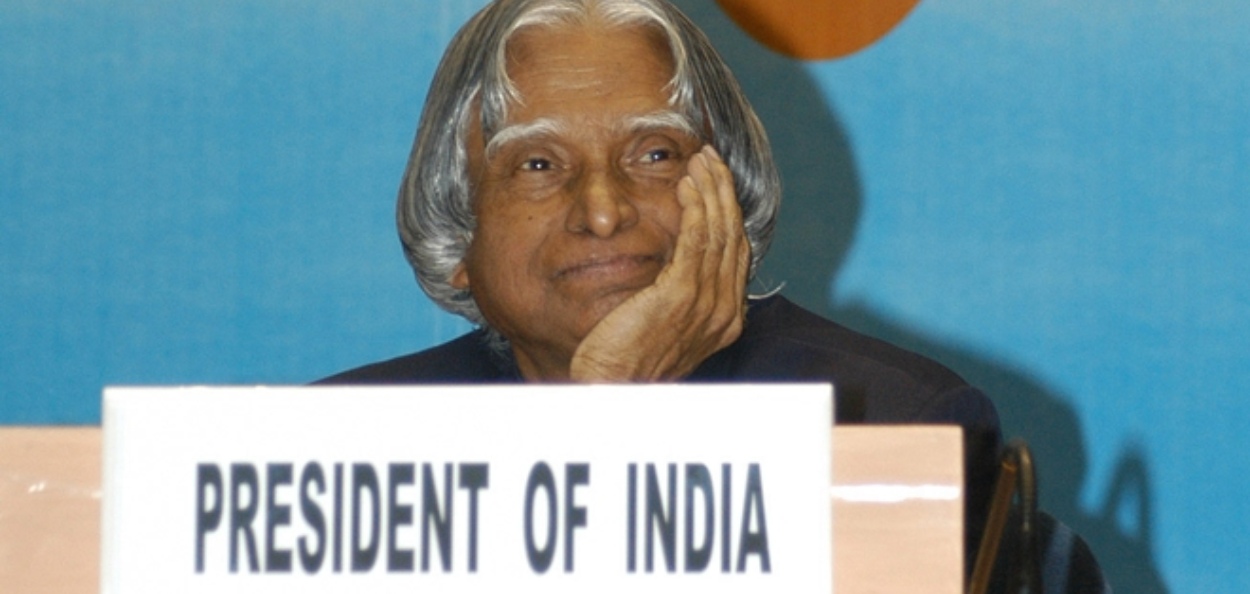
Manjit Thakur/New Delhi
The world knows APJ Abdul Kalam as a man of science and the person responsible for India’s much-advanced missile programme. However not many know about the spiritual side of the person that India’s most loved President.
He has chronicled his journey into the spiritual aspect of life in his book Transcendence: My Spiritual Experiences with Pramukh Swamiji.
President Kalam had met Pramukh Swamiji Maharaj, the fifth spiritual successor of Lord Swaminarayan, a Hindu seer in whose name there are Akshardham temples in many parts of India, and it turned into a deeper friendship and evolved as a confluence of spirituality and science.
Dr Kalam has shared his experiences of spending time with Pramukh Swamiji in a book that has also been translated into Hindi by the author.
In the book, Dr. Kalam has dwelt upon the philosophy of life in politics, technology, society, and international relations.
Kalam writes, “As a boy of ten years, I remember that three different personalities used to visit our house from time to time. Pakshi Lakshmana Shastrigal, a Vedic scholar and chief priest of the famous Rameshwaram temple and Reverend Father Bodal, who founded the first church on the island of Rameshwar, visited my father, who was the imam of a mosque.
They would sit in our bear, take a cup of tea in their hands, and all three would discuss the problems of our society and invariably find a solution.
Kalam writes, “There has been a healthy tendency in India for thousands of years to unify different ideas and reach a consensus. In such a situation, I automatically started to feel that such inter-religious meetings in my village are quite exemplary. Because today, more than ever, such frank and friendly dialogue between cultures, religions, and civilizations, is needed throughout the country and also in the rest of the world.”
Referring to Scientist Dr. Brahm Prakash, Kalam writes, “He taught me how tolerance for the views and opinions of others is essential to building a team and accomplishing tasks beyond one's capacity.
“He taught me that life is a priceless gift, but with it comes responsibilities. With that gift, we are expected to use our talents to better the world, to live our lives morally and in a balanced way, and to prepare for the spiritual life, which is eternal."
Kalam has written that Dr. Brahma Prakash changed his perspective of looking at the world. Once he told me, 'Kalam, if you look at this world as narrow and indecent, it will break your concentration.”
Negative thinking is like carrying 20 bags on a journey. This furnishing will make your journey difficult, and your
progress will be slow.'
In the foreword to this book, Dr. Kalam mentioned the meeting with the Jain monk Acharya Mahapragya. He writes: “he taught me that our consciousness is the birthplace of our morality.”
He said, 'We know that something is right only when our consciousness is clear. Our consciousness is our real friend. Together we wrote The Family and the Nation and took two steps to listen to our consciousness – to become self-conscious. So that we can connect with our consciousness, and do what our consciousness says.
“I had met my real Guru Pramukh Swamiji unknowingly. Perhaps it was my curiosity and luck that had led me to them. Earlier, as the Principal Scientific Adviser to the Government of India, I visited Bhuj to review the rehabilitation work after the earthquake.
“At the same time, on 15 March 2001, I met Sadhu Brahmavihari Das, who was a disciple of Pramukh Swamiji. He asked me a startling question that required a spiritual response.
“He asked: 'After detonating the first atomic bomb, Robert Oppenheimer remembered the Gita: "I am the destroyer of the world." What came to your mind when you made the first atomic bomb for India?”
Kalam wrote, "I was taken aback by this question, and I said, 'The power of God does not destroy, it creates.”
To this, he replied, 'Our spiritual teacher, Pramukh Swami Maharaj, is a great unifier. He has integrated our energies into taking the life out of the wreckage and reviving it.'
The Book gives reader a closer look into kalam’s vision of life. He writes, “A harmonious world may seem like an impossible utopia but with transcendental guidance, and by acknowledging the unity of every living being and with the help of pioneering sages like Pramukh Swamiji, this impossible can also be achieved.
“A harmonious world begins with a harmonious conscience—an indispensable spiritual fact. To ignite our spirituality, we have to look inside and control our ego. We need to recognize and connect with the continuum of the soul within us.”
ALSO READ: Indian Army organises free CLAT coaching classes in Kashmir
